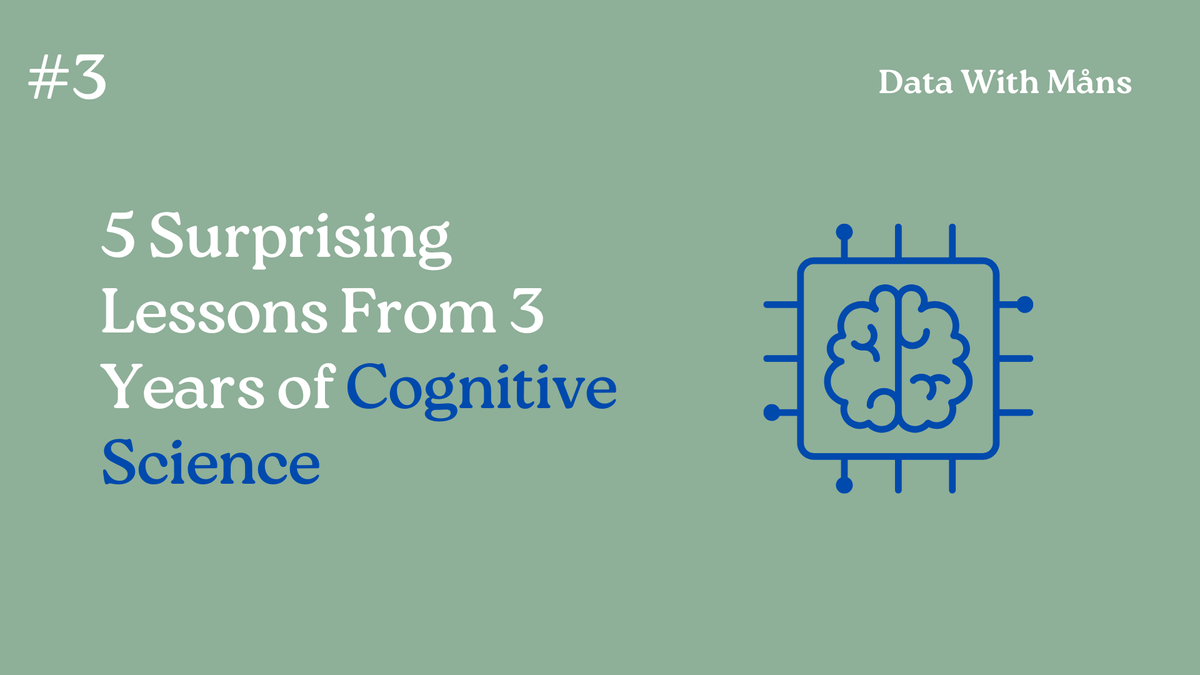5 Surprising Lessons From 3 Years of Cognitive Science
The insights I'm keeping after a bachelor's degree in Cognitive Science at Gothenburgs University

As I'm moving closer to graduation I thought it would be suitable for me to share some lessons I've learned from my first 3 years in university, studying Cognitive Science at Gothenburgs University.
Here's a list of the most interesting things i learned in 700 words or less:
Rationality is an illusion
We pride ourselves on being rational beings, but psychology and neuroscience tell us a different story. Our brains evolved primarily for efficiency, not accuracy.
The shortcuts and assumptions that shape our thinking run so deep they even influence our sensory experiences.
In short, what you see, hear and feel isn't reality - It's your brain's best guess at what might be useful.
As psychologist Daniel Khaneman puts it: "We're not irrational, we're just efficiently wrong." This isn't a flaw - It's how our minds were designed to function in an unpredictable environment.
Using Less Brainpower Makes You Smarter
While watching the movie Limitless, I instantly got excited about the idea of how to use more of my brain capacity.
- Seing hidden patterns
- Having perfect memory
- Calculating effortlessly
But upon taking a course in neuroscience, I understood how faulty my belief actually was.
When we're at our smartest (in a flow state), our brain isn't "lighting up" with lots of activity - It's dimming. What's even more fascinating is that the area of the brain the experiences the most reduction in activity when in flow is the prefrontal cortex - The "rational and executive" part of the brain.
This means that expertice is largely the process of using your subconscious mind to process information as opposed to your conscious mind (Khaneman would refer to System 1 & System 2).
This is generally the opposite of what people believe, and hence why this counterintuitive fact stuck with me.
Consciousness is a Total Mystery - Even to Scientists
Despite hundreds of years of discussion by the most, and over 100 years of neuroscience, we still have no idea what actually makes us feel things.
We know a lot about the "how" of the brain works, but the "Why do i have experience"-question has never really been answered, and likely never will.
Some scientists believe consciousness is an emergent property, others that it is fundamental to reality. What's fascinating is that the most intimate aspect of our existence - being conscious - remains science's greatest mystery.
The Importance of Sleep
Each night when you sleep, your brain activates its waste disposal system. Think of it like a city's nighttime cleaning crew—when the streets are empty, the pressure washers come out. The glymphatic system expands the space between brain cells by up to 60% during deep sleep, allowing cerebrospinal fluid to flush away toxic buildups.
Imagine your brain as a bustling marketplace that transforms after hours. The vendor stalls (your neurons) actually move apart, creating wider pathways for the cleanup crew (cerebrospinal fluid) to sweep through and remove the day's debris.
This explains why sleep deprivation impairs thinking so dramatically. It's like canceling trash collection—the garbage piles up, blocks pathways, and creates dysfunction. Skip your brain's maintenance cycle, and just like ignoring oil changes in your car, the system quickly breaks down.
Why Modern Humans are Sad and Depressed All the Time
Whenever I feel anxious or depleted, I ask myself:
"In what ways has my life differed from how humans lived 70,000 years ago in the last 72 hours?"
Think of your brain as ancient software forced to run modern applications. Our neural wiring evolved for movement, whole foods, sunset-to-sunrise sleep cycles, and intimate tribal connections.
Today we're sedentary, consuming processed substances, ignoring natural light cycles, and substituting notifications for genuine connection.
Your brain isn't broken—it's operating exactly as designed, just in an environment it wasn't programmed to handle.
The most effective "mental hacks" aren't new technologies—they're simply returning to the original human operating system: move naturally, eat real food, honor darkness, and truly connect with your tribe.
I hope you enjoyed this selection of insights from my 3 years of Cognitive Science.
Until next week,
Måns